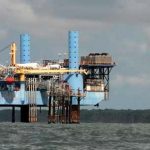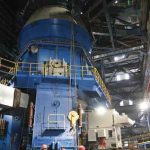Driving investment
One of the benefits of the ongoing reforms in Nigeria’s oil and gas industry, especially the downstream sector, is to make it attractive to foreign investors.
Already numerous local operators are entering Nigeria because of the turnaround on investment and easy access to funding from Nigerian banks to run their operations. Indeed, the downstream sector is the mirror of the upstream because it is the closest to the people, providing the refined petroleum products they use for business and domestic uses. As a result there are numerous opportunities for future investments.
Deregulation of the downstream sector is identified as a move to attract foreign direct investment. The sector is not as fully deregulated. Some petroleum products, notably premium motor spirit (PMS or gasoline) and household kerosene (HHK), enjoy a government subsidy. Other petroleum products have been deregulated, including automotive gasoil (diesel), bitumen, aviation turbine kerosene (Jet A1), Lique!ed Petroleum Gas (LPG), fuel oil (LPFO) and a host of other products.
To reduce the burden on consumers, the Nigerian government reimburses oil marketers who sell gasoline and kerosene below prevailing market prices. Recent measures to remove the subsidy, which resulted in a 49% increase in the pump price of gasoline, met with stiff resistance from organized labor and civil society groups.
Benefits of deregulation

Downstream deregulation dates back to 2003 when the Nigerian government started phased deregulation of the sector.
“The benefits of deregulation include opening the sector for competition and removing entry barriers in the supply and distribution of petroleum products,” says Reginald Stanley, Executive Secretary of the Petroleum Products Pricing Regulatory Agency (PPPRA), which regulates commercial activities in the downstream sector. “Deregulation eliminates waste and corruption, a development that brought the subsidy regime under probes, and gives fair margins to marketers.”
The subsidy probes underscore more than anything else the need to open up the sector to a free market economy, as regulation makes it unattractive to investors. This is the reason why the oil majors operating in the sector – Shell, Mobil, Chevron, Total and Agip – all refuse to invest in refining. Almost all of them, excluding ExxonMobil and Total divested from the sector.
The exit of these majors gave room for other players, such as Oando, Conoil, Forte Oil (formerly AP), MRS, Capital Oil and Gas and Sahara, to emerge as big players. However, the Pipeline and Products Marketing Company (PPMC), the commercial arm of the state-owned Nigerian National Petroleum Corporation (NNPC), is the biggest player and owns most of the downstream facilities.

But under current reforms, the situation is expected to change as opportunities abound not only in oil, but also in downstream gas.
“Across the sectors, investment opportunities abound for willing multinationals and other partners as the federal government has worked out different investment partnership models, especially through Public Private Partnerships to guarantee returns on investments,’’ says Diezani Alison-Madueke, Nigeria’s Petroleum Minister.
Existing facilities
Currently, Nigeria has four refineries including Port Harcourt 1 and 2, Kaduna and Warri, with a combined capacity of 445,000 barrels per day. There are 5,120 km (3,200 miles) of pipelines that transport petroleum products across the country.
The NNPC owns 22 storage depots and a host of other depots are owned by private operators under the auspices of Major Oil Marketers Association of Nigeria (MOMAN). MOMAN is made up of oil marketing ventures owned by the local affiliates of international oil companies, most of which have been bought out by Nigerians. It comprises Mobil Oil, Total, Oando, MRS, Conoil and Forte Oil.
Depots owned by MOMAN include NIPCO depot, the commercial arm of the Independent Petroleum Marketers Association (IPMAN), as well as those owned by the Deport and Petroleum Products Marketers Association (DAPPMA) and those belonging to Jetty and Petroleum Products Tank Farm Operators of Nigeria (JEPFTON). Apart from the NNPC, DAPPMA and JEPFTON, all other downstream trade associations cater for their members.
IPMAN has the largest membership and is mostly made up of small indigenous marketers who own one or two outlets in particular locations. Their numbers make them less manageable. DAPPMA and JEPFTON are more of the tank farm operators. The majority indulge in throughput arrangements for storing petroleum products, while only a handful has retail outlets.
Opportunities
Even though these facilities seem an awful lot, for a country with about 150 million people, they are hardly adequate. As such, investors will have huge returns on investment by investing in logistics for supply and distribution (especially petroleum trucks), pipelines, and storage facilities outside Lagos as the region is already saturated and under pressure for products supply from other states.
Pipeline security offers another opportunity for wealth creation as pipeline vandalism is on the rise, leading to more than 20% product losses annually. Petrochemical is another area with huge prospects in the areas of refined mineral oil, petroleum jelly and grease. Building of asphalt storage, packaging and blending plants to handle products for export are also required.
Natural gas
Nigeria is now referred to as more of a natural gas country than oil with almost four times the amount of gas than oil reserves. Gas reserves are estimated at about 187 trillion cubic feet (tcf) in addition to an undiscovered potential as high as about 600 tcf. As a result, investors from the US, India and Saudi Arabia are seeking a chunk of the opportunities offered by gas.
However, despite the huge gas resources, the focus is more on export gas than domestic gas, which creates a huge gap in the system. The Gas Master Plan, popularly tagged the Gas Revolution, was approved by President Goodluck Jonathan in February 2008 as a guide for the commercial exploitation and management of Nigeria’s gas sector.
The Plan aims at growing the Nigerian economy with gas by stimulating the multiplier effect of gas in the domestic economy, positioning Nigeria competitively in high value export markets, and guaranteeing the long-term energy security of Nigeria.
“We are pursuing the development of Nigeria’s natural gas sector from three distinct anchors,” says David Ige, Group Executive Director of NNPC’s Gas and Power division. “The first is gas-to-power, the second is gas for gas-based industrialization, and the third is gas for export, which includes regional and export Liquefied Natural Gas or LNG.”?
Ige argues that each of these key areas presents a deluge of investment opportunities.
“We have investment opportunities in pipelines,” he says. “We are looking for investors to participate in the central processing facilities. We are also looking for investors to participate in the LPG value chain, and we are looking for general infrastructure players – civil and ports infrastructure and also infrastructure investors that will play a role in all the free trade zones we are working on.”
Other key LPG opportunities include the domestic production and marketing of LPG, as Nigeria has one of the least per capita consumption of LPG estimated at 0.5%. Other opportunities include manufacturing of LPG cylinders, valves and regulators, installation of filing plants, retail distribution and development of simple, flexible and much less expensive gas burners to encourage the use of gas instead of wood and other fuels; exploration, gathering, production and processing to transmission; and the establishment of small scale industries to produce chemicals and solvents, for example chlorinated methane, formaldehyde, acetylene, etc., from natural gas.
The Gas Master Plan has specific timelines for project targets. For gas-to-power, the objective is a four-fold increase in generating capacity by 2015. For gasbased industrialization, the goal is to build three major centers for gas processing and extraction for gasbased industries in order to reposition Nigeria as the preferred destination for gas-based industries, such as fertilizer, petrochemical and methanol.
LNG
For gas export, Nigeria’s Liquefied Natural Gas (LNG) sector is reputed to be the fastest growing in the world. The Nigeria LNG plant has an installed capacity of about 22 million tons per year of LNG and 4 million tons per year of LPG. Plans are underway to increase capacity to more than 30 million tons a year.
Shareholders in the Nigeria LNG plant include NNPC (49%), Shell Gas B.V. (25.6%), Total LNG Nigeria (15%), and ENI International (10.4%). Several other LNG projects are underway. Furthermore, most of the oil majors are involved in gas-to-liquids projects to meet rising global energy demand.
For more information:
Nigerian National Petroleum Corporation (NNPC)
National Petroleum Investment Management Services
(NAPIMS)
Department of Petroleum Resources (DPR)
Petroleum Products Pricing Regulatory Agency
(PPPRA)
Nigerian Content Development Management Board
(NCDMB)
National Petroleum Research Center
Petroleum Technology Development Fund (PTDF)
Petroleum Equalisation Fund (PEF)



